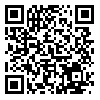Volume 13, Issue 2 (April 2019)
Qom Univ Med Sci J 2019, 13(2): 19-26 |
Back to browse issues page
Download citation:
BibTeX | RIS | EndNote | Medlars | ProCite | Reference Manager | RefWorks
Send citation to:



BibTeX | RIS | EndNote | Medlars | ProCite | Reference Manager | RefWorks
Send citation to:
Sabaghi A, Heirani A, Kiani A, yousefvand N. Effect of Seizure During Pregnancy on Seizure Susceptibility in Mouse offspring . Qom Univ Med Sci J 2019; 13 (2) :19-26
URL: http://journal.muq.ac.ir/article-1-2162-en.html
URL: http://journal.muq.ac.ir/article-1-2162-en.html
1- Department of Motor Behavior, School of Physical Education & Sport Sciences, Razi University
2- Department of Motor Behavior, School of Physical Education & Sport Sciences, Razi University ,iliaheirani@yahoo.com
3- Pharmaceutical Sciences Research Center, School of Pharmacy, Kermanshah University of Medical Sciences
4- Department of Physiology, School of Basic Sciences, Razi University
2- Department of Motor Behavior, School of Physical Education & Sport Sciences, Razi University ,
3- Pharmaceutical Sciences Research Center, School of Pharmacy, Kermanshah University of Medical Sciences
4- Department of Physiology, School of Basic Sciences, Razi University
Abstract: (4330 Views)
Background and Objectives: Epilepsy is a neurodevelopmental disorder, which based on the evidences of prenatal factors, has a significant influence on the development of nervous system in offspring. The present study was performed to investigate the effect of seizure in pregnancy on pentylenetetrazol (PTZ)-induced seizure behavior in offspring.
Methods: In this experimental study, after pregnancy stabilization in mice, one group was classified as the negative control group and the rest of the kindled pregnant mice were assigned to three groups, including: 1) seizure induction group between the fourteenth and nineteenth days of pregnancy (once in 48 hours), 2) sham group received normal saline intraperitoneally on the fourteenth to nineteenth days of pregnancy (once in 48 hours), and 3) control group consisting of pregnant mice kindled without injection during pregnancy. On the day 15 (weanling period) and 24 (post-weanling period), seizure susceptibility to PTZ in offspring of the studied groups, was evaluated. Data were analyzed using Kruskal - Wallis statistical test.
Results: In this study, the seizure susceptibility of the offspring in PTZ-treated group in post-weanling period significantly was higher compared to the offspring in other groups (p<0.05). However, there was no difference in the seizure susceptibility between offspring in weanling period (p>0.05).
Conclusion: The present study findings showed that with increasing age, the seizure potential of offspring of the mice treated with PTZ increases compared to the offspring of the control group.
Methods: In this experimental study, after pregnancy stabilization in mice, one group was classified as the negative control group and the rest of the kindled pregnant mice were assigned to three groups, including: 1) seizure induction group between the fourteenth and nineteenth days of pregnancy (once in 48 hours), 2) sham group received normal saline intraperitoneally on the fourteenth to nineteenth days of pregnancy (once in 48 hours), and 3) control group consisting of pregnant mice kindled without injection during pregnancy. On the day 15 (weanling period) and 24 (post-weanling period), seizure susceptibility to PTZ in offspring of the studied groups, was evaluated. Data were analyzed using Kruskal - Wallis statistical test.
Results: In this study, the seizure susceptibility of the offspring in PTZ-treated group in post-weanling period significantly was higher compared to the offspring in other groups (p<0.05). However, there was no difference in the seizure susceptibility between offspring in weanling period (p>0.05).
Conclusion: The present study findings showed that with increasing age, the seizure potential of offspring of the mice treated with PTZ increases compared to the offspring of the control group.
Type of Study: Original Article |
Subject:
فیزیولوژی
Received: 2018/06/20 | Accepted: 2018/07/25 | Published: 2019/04/15
Received: 2018/06/20 | Accepted: 2018/07/25 | Published: 2019/04/15
Send email to the article author
| Rights and permissions | |
 |
This work is licensed under a Creative Commons Attribution-NonCommercial 4.0 International License. |









